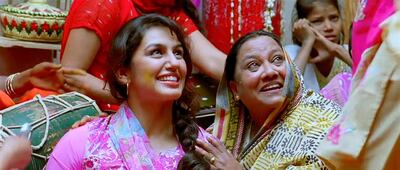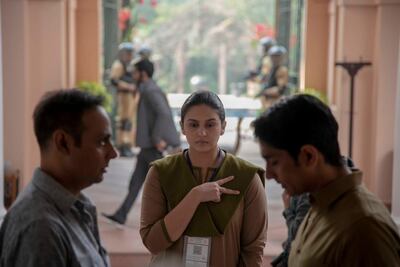Huma Qureshi has benefited from the growing popularity of social-realist dramas in India. No longer does someone need to excel in Bollywood song and dance musicals to become a household name. It's arguable that the root to Qureshi's fame makes her the quintessential modern Indian actress.
Her star continues to rise unabated – last month she was walking the red carpet in Cannes, and this week she'll be lighting up our television screens at the centre of the new dystopian Netflix series Leila, executive produced by Indo-Canadian auteur Deepa Mehta, best known for directing the Elements Trilogy: Fire (1996), Earth (1999) and Water (2005).
A changing industry
Qureshi made her breakthrough appearing in Gangs of Wasseypur, a five-hour-plus opus directed by Anurag Kashyap, the godfather of the Indian independent film scene, which played at the Cannes Film Festival in 2012.
At that time, when social-realist dramas were barely making inroads into the Indian consciousness, it was hard to imagine that Qureshi would end up being one of the most sought-after actresses in India, and beyond. Even more surprising is that she would achieve this fame without having to abandon character- driven roles to appear solely in Bollywood blockbusters.
The New Delhi-born actress started out in theatre, but she got her commercial break through modelling and appearing in advertising campaigns. Kashyap gave her a three-film deal, which set her off on a more independent route. She chose genre roles in films such as supernatural thriller Ek Thi Daayan and Dobaara: See Your Evil. British director Gurinder Chadha cast her in partition drama Viceroy's House. She's done bigger budget Indian fare, too, appearing in neo-noir action thriller Badlapur.
With such variation and strong performances, she is on the verge of superstardom. Speaking on the phone from India, she says, "I'm not sure my career would have taken off 10 years ago. I'm very grateful that the industry is changing and is allowing room for actors like me, who are doing more discerning work, performing in these really gritty roles where one really gets under the skin of the character."
A chance meeting
Given her status as the go-to actor for meaty, character-driven roles, it makes sense that Open Air Films asked Qureshi to meet Mehta, who was in the process of turning Prayaag Akbar’s 2017 novel into a six-part Netflix series. “I went to meet Deepa. She was amazing, of course. We got along from the word go.”
The role called for an actress to play the mother of a kidnapped child in the imagined totalitarian future world of Aryavarta, where climate change has made water a scarce resource. After meeting Mehta, Qureshi read Akbar's book. She met with Mehta again "to discuss what I thought of the book, the world created in it, and my interpretation of Shalina Phatak, the character I play", Qureshi recalls. "She also wanted to know what my process was as an actor: whether I was method, or more instinctive or whatnot. I thought that was pretty cool."
In answer to Mehta's question on her approach to acting, she says: "I'm a very instinctive actor. I hate the word method acting, I think a lot of actors have overused or misused it." So understanding this, "Mehta gave me a lot of freedom to play the character and to discuss my ideas and my personal experiences as a person."
Preparing for 'Leila'
The story may be set in 2047, but the themes of sectarianism, environmental crisis and lack of housing feel like they are talking about the present in the billion-people state. The first episode starts with Shalina, her husband Rizwan (Rahul Khanna) and daughter Leila swimming in their pool and chatting on their hologram phone with Leila’s uncle. This idyll is broken when the authorities burst in. Rizwan’s first instinct is to argue that he has a licence to have water in his pool, but the authorities want to take away Leila, the “unpure” child of a Hindu and Muslim. Shalina is put into a rehabilitation facility, where she is told that if she wants to see her child again, she must renounce her past.
Qureshi says the themes of shame, honour, caste and religion resonate. "It's what people are obsessed with, right? For example people talk about honour killing, which is actually the most dishonourable thing that one can do, or who you're going to get married to and what's going to happen, whether you will be bringing the family name down. Of course this is set in a dystopian future, but it's very Black Mirror-ish in the way that it is conceived."
The series has been compared to The Handmaid's Tale, but Qureshi sees the execution of it, where we are in a future that looks like the present, as being more like that of Black Mirror – one of her favourite television shows.
"No one knows what the future looks like, and we're very clear, it's not a Blade Runner kind of future where there are things flying around and whatever, it has to be relatable. Because it's a dystopian future, it has to still feel like it can happen to you today. If you watch one of the episodes, then you're like: 'oh my God these people look like us, they eat the same food, and they drive a similar car.' But there is one thing that feels futuristic."
The environmental theme was also a big hook for Qureshi. "Water is going to be a big issue for us all, especially at the rate we are going about abusing the environment. I can imagine water ATMs or people with guns protecting water. With the kind of heat and extreme weather that's happening today, would people not kill for a glass of water? I see that as a possibility."
So what's next?
For the actress, who has signed up to star in Batman v Superman: Dawn of Justice director Zack Snyder's latest zombie film, Army of the Dead, the possibilities seem endless. She doesn't lack self-confidence, jokingly stating that the secret of her success is because, "I'm such an amazing actor, that I can do anything. I'm the superhero of my own life".
She also says that she finds joy in straddling the independent film scene with Hollywood, the low-budget productions with the glamour of the Cannes red carpet. "I clean up pretty OK," she states. "I can walk a red carpet, I don't see why they [being in independent films and being glamorous] are mutually exclusive of each other. I think the gap is fast closing and we're part of a new generation of actors who are acting and doing the fun stuff. Why should I not wear a pretty dress and get a thousand camera clicks and endorse brands?"
And given her growing status, and the likely popularity of Leila, Qureshi is going to have ever more demands both on screen and waltzing up red carpets.
Leila will be available to stream on Netflix on June 14




